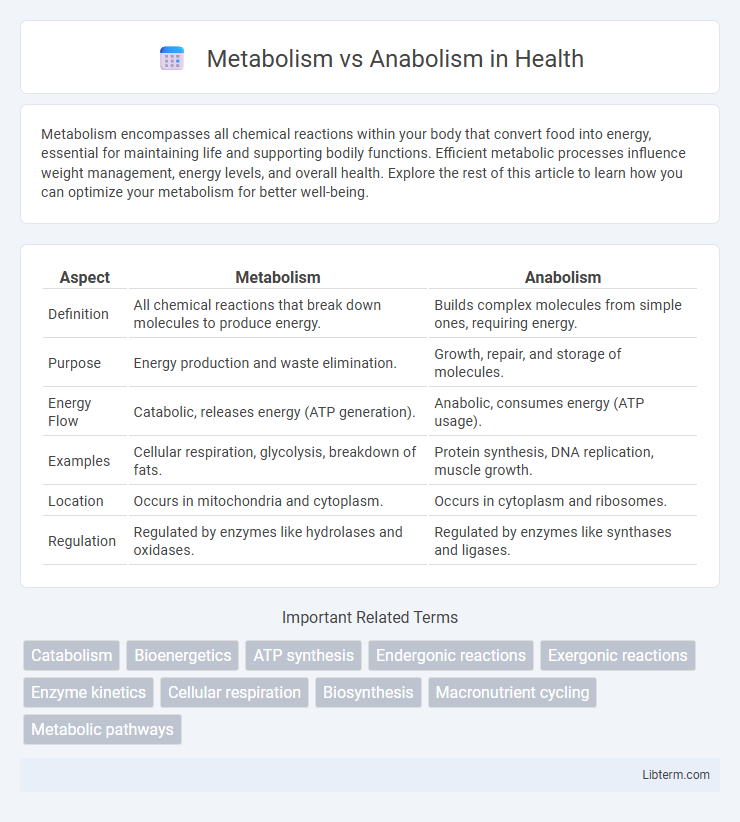Metabolism encompasses all chemical reactions within your body that convert food into energy, essential for maintaining life and supporting bodily functions. Efficient metabolic processes influence weight management, energy levels, and overall health. Explore the rest of this article to learn how you can optimize your metabolism for better well-being.
Table of Comparison
| Aspect | Metabolism | Anabolism |
|---|---|---|
| Definition | All chemical reactions that break down molecules to produce energy. | Builds complex molecules from simple ones, requiring energy. |
| Purpose | Energy production and waste elimination. | Growth, repair, and storage of molecules. |
| Energy Flow | Catabolic, releases energy (ATP generation). | Anabolic, consumes energy (ATP usage). |
| Examples | Cellular respiration, glycolysis, breakdown of fats. | Protein synthesis, DNA replication, muscle growth. |
| Location | Occurs in mitochondria and cytoplasm. | Occurs in cytoplasm and ribosomes. |
| Regulation | Regulated by enzymes like hydrolases and oxidases. | Regulated by enzymes like synthases and ligases. |
Introduction to Metabolism and Anabolism
Metabolism encompasses all chemical reactions in living organisms that maintain life, including catabolic processes that break down molecules for energy. Anabolism is the subset of metabolism focused on building complex molecules from simpler ones, crucial for cell growth and repair. Understanding the balance between catabolism and anabolism highlights their interconnected roles in maintaining cellular function and energy homeostasis.
Defining Metabolism: The Body’s Energy Engine
Metabolism is the body's complex biochemical process that converts food into energy, fueling vital functions such as cellular repair, movement, and temperature regulation. It encompasses catabolism, where molecules are broken down to release energy, and anabolism, which uses energy to build and repair tissues. Understanding metabolism is crucial for optimizing energy balance, weight management, and overall health.
Understanding Anabolism: The Building Phase
Anabolism is the metabolic phase focused on synthesizing complex molecules from simpler ones, crucial for cell growth and repair. It consumes energy, primarily in the form of ATP, to build proteins, nucleic acids, and lipids necessary for tissue development and maintenance. Understanding anabolism reveals its role in supporting overall metabolism by enabling the construction of cellular components essential for energy storage and structural integrity.
Key Differences Between Metabolism and Anabolism
Metabolism encompasses all chemical reactions within an organism, including both catabolic and anabolic processes, whereas anabolism specifically refers to the synthesis of complex molecules from simpler ones, requiring energy input. Metabolic pathways include energy-releasing reactions that break down molecules and energy-consuming reactions that build cellular components, highlighting their functional distinction. Key differences lie in metabolism's broad scope of energy transformation and molecular turnover compared to anabolism's focused role in biosynthesis and growth.
Metabolic Pathways: Catabolism vs Anabolism
Metabolic pathways encompass both catabolism, which breaks down complex molecules like carbohydrates and lipids to release energy, and anabolism, which utilizes this energy to synthetize molecules such as proteins and nucleic acids. Catabolic pathways involve processes like glycolysis and the citric acid cycle that generate ATP and NADH, essential for cellular functions. Anabolic pathways depend on ATP and reducing power from catabolic reactions to drive biosynthesis, enabling cell growth, repair, and maintenance.
Hormonal Regulation in Metabolism and Anabolism
Hormonal regulation plays a crucial role in balancing metabolism and anabolism, with insulin promoting anabolic processes by facilitating glucose uptake and protein synthesis, while glucagon and cortisol stimulate metabolic pathways like gluconeogenesis and lipolysis to increase energy availability. Thyroid hormones enhance basal metabolic rate by upregulating mitochondrial activity and energy production, supporting both catabolic and anabolic reactions depending on cellular demands. Growth hormone primarily drives anabolic growth by stimulating amino acid uptake and protein synthesis, while also mobilizing fat stores for energy during metabolic stress.
Role of Nutrition in Anabolic and Metabolic Processes
Nutrition plays a critical role in supporting both metabolism and anabolism by providing essential macronutrients and micronutrients that fuel cellular processes and tissue growth. Adequate protein intake supplies amino acids necessary for anabolic reactions, promoting muscle repair and synthesis, while carbohydrates and fats serve as primary energy sources for metabolic activities. Vitamins and minerals act as cofactors in enzymatic reactions, ensuring efficient metabolic pathways and balanced anabolic functions essential for overall health and energy regulation.
Impact of Exercise on Metabolism and Anabolism
Exercise significantly enhances metabolism by increasing energy expenditure and promoting the breakdown of carbohydrates and fats for fuel. Physical activity stimulates anabolism by activating muscle protein synthesis, leading to muscle growth and repair. Regular exercise improves metabolic rate and supports anabolic processes, contributing to overall health and fitness.
Common Myths About Metabolism and Anabolism
Common myths about metabolism suggest it solely dictates weight loss, ignoring the complex roles of anabolism and catabolism in energy management. Anabolism is frequently misunderstood as merely muscle building, yet it encompasses all biosynthetic processes essential for cell repair and growth. Misconceptions obscure how metabolic rate fluctuations affect overall health, emphasizing the need for accurate knowledge in metabolic biochemistry.
Optimizing Health: Balancing Metabolism and Anabolism
Optimizing health involves balancing metabolism, the process by which the body converts nutrients into energy, with anabolism, the synthesis of complex molecules from simpler ones to build and repair tissues. Efficient metabolism supports energy production and weight management, while a well-regulated anabolic state promotes muscle growth, recovery, and overall cellular repair. Nutrient-rich diets combined with resistance training and adequate rest enhance both metabolic rate and anabolic activity, crucial for maintaining optimal physical health.
Metabolism Infographic

 libterm.com
libterm.com